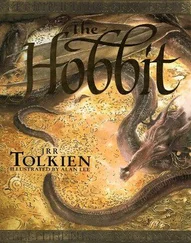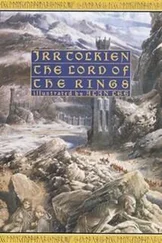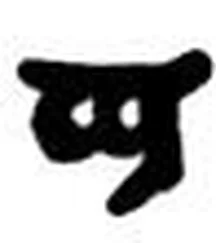The spouse of Aulë is Yavanna, the Giver of Fruits. She is the lover of all things that grow in the earth, and all their countless forms she holds in her mind, from the trees like towers in forests long ago to the moss upon stones or the small and secret things in the mould. In reverence Yavanna is next to Varda among the Queens of the Valar. In the form of a woman she is tall, and robed in green; but at times she takes other shapes. Some there are who have seen her standing like a tree under heaven, crowned with the Sun; and from all its branches there spilled a golden dew upon the barren earth, and it grew green with corn; but the roots of the tree were in the waters of Ulmo, and the winds of Manwë spoke in its leaves. Kementári, Queen of the Earth, she is surnamed in the Eldarin tongue.
The Fëanturi, masters of spirits, are brethren, and they are called most often Mandos and Lórien. Yet these are rightly the names of the places of their dwelling, and their true names are Námo and Irmo.
Námo the elder dwells in Mandos, which is westward in Valinor. He is the keeper of the Houses of the Dead, and the summoner of the spirits of the slain. He forgets nothing; and he knows all things that shall be, save only those that lie still in the freedom of Ilúvatar. He is the Doomsman of the Valar; but he pronounces his dooms and his Judgements only at the bidding of Manwë. Vairë the Weaver is his spouse, who weaves all things that have ever been in Time into her storied webs, and the halls of Mandos that ever widen as the ages pass are clothed with them.
Irmo the younger is the master of visions and dreams. In Lórien are his gardens in the land of the Valar, and they are the fairest of all places in the world, filled with many spirits. Estë the gentle, healer of hurts and of weariness, is his spouse. Grey is her raiment; and rest is her gift. She walks not by day, but sleeps upon an island in the tree-shadowed lake of Lórellin. From the fountains of Irmo and Estë all those who dwell in Valinor draw refreshment; and often the Valar come themselves to Lórien and there find repose and easing of the burden of Arda.
Mightier than Estë is Nienna, sister of the Fëanturi; she dwells alone. She is acquainted with grief, and mourns for every wound that Arda has suffered in the marring of Melkor. So great was her sorrow, as the Music unfolded, that her song turned to lamentation long before its end, and the sound of mourning was woven into the themes of the World before it began. But she does not weep for herself; and those who hearken to her learn pity, and endurance in hope. Her halls are west of West, upon the borders of the world; and she comes seldom to the city of Valimar where all is glad. She goes rather to the halls of Mandos, which are near to her own; and all those who wait in Mandos cry to her, for she brings strength to the spirit and turns sorrow to wisdom. The windows of her house look outward from the walls of the world.
Greatest in strength and deeds of prowess is Tulkas, who is surnamed Astaldo, the Valiant. He came last to Arda, to aid the Valar in the first battles with Melkor. He delights in wrestling and in contests of strength; and he rides no steed, for he can outrun all things that go on feet, and he is tireless. His hair and beard are golden, and his flesh ruddy; his weapons are his hands. He has little heed for either the past or the future, and is of no avail as a counsellor, but is a hardy friend. His spouse is Nessa, the sister of Oromë, and she also is lithe and fleetfooted. Deer she loves, and they follow her train whenever she goes in the wild; but she can outrun them, swift as an arrow with the wind in her hair. In dancing she delights, and she dances in Valimar on lawns of never-fading green.
Oromë is a mighty lord. If he is less strong than Tulkas, he is more dreadful in anger; whereas Tulkas laughs ever, in sport or in war, and even in the face of Melkor he laughed in battles before the Elves were born. Oromë loved the lands of Middle-earth, and he left them unwillingly and came last to Valinor; and often of old he passed back east over the mountains and returned with his host to the hills and the plains. He is a hunter of monsters and fell beasts, and he delights in horses and in hounds; and all trees he loves, for which reason he is called Aldaron, and by the Sindar Tauron, the Lord of Forests. Nahar is the name of his horse, white in the sun, and shining silver at night. The Valaróma is the name of his great horn, the sound of which is like the upgoing of the Sun in scarlet, or the sheer lightning cleaving the clouds. Above all the horns of his host it was heard in the woods that Yavanna brought forth in Valinor; for there Oromë would train his folk and his beasts for the pursuit of the evil creatures of Melkor. The spouse of Oromë is Vána, the Ever-young; she is the younger sister of Yavanna. All flowers spring as she passes and open if she glances upon them; and all birds sing at her coming.
These are the names of the Valar and the Valier, and here is told in brief their likenesses, such as the Eldar beheld them in Aman. But fair and noble as were the forms in which they were manifest to the Children of Ilúvatar, they were but a veil upon their beauty and their power. And if little is here said of all that the Eldar once knew, that is as nothing compared with their true being, which goes back into regions and ages far beyond our thought. Among them Nine were of chief power and reverence; but one is removed from their number, and Eight remain, the Aratar, the High Ones of Arda: Manwë and Varda, Ulmo, Yavanna and Aulë, Mandos, Nienna, and Oromë. Though Manwë is their King and holds their allegiance under Eru, in majesty they are peers, surpassing beyond compare all others, whether of the Valar and the Maiar, or of any other order that Ilúvatar has sent into Eä.
Of the Maiar
With the Valar came other spirits whose being also began before the World, of the same order as the Valar but of less degree. These are the Maiar, the people of the Valar, and their servants and helpers. Their number is not known to the Elves, and few have names in any of the tongues of the Children of Ilúvatar; for though it is otherwise in Aman, in Middle-earth the Maiar have seldom appeared in form visible to Elves and Men.
Chief among the Maiar of Valinor whose names are remembered in the histories of the Elder Days are Ilmarë, the handmaid of Varda, and Eönwë, the banner-bearer and herald of Manwë, whose might in arms is surpassed by none in Arda. But of all the Maiar Ossë and Uinen are best known to the Children of Ilúvatar.
Ossë is a vassal of Ulmo, and he is master of the seas that wash the shores of Middle-earth. He does not go in the deeps, but loves the coasts and the isles, and rejoices in the winds of Manwë; for in storm he delights, and laughs amid the roaring of the waves. His spouse is Uinen, the Lady of the Seas, whose hair lies spread through all waters under sky. All creatures she loves that live in the salt streams, and all weeds that grow there; to her mariners cry, for she can lay calm upon the waves, restraining the wildness of Ossë. The Númenóreans lived long in her protection, and held her in reverence equal to the Valar.
Melkor hated the Sea, for he could not subdue it. It is said that in the making of Arda he endeavoured to draw Ossë to his allegiance, promising to him all the realm and power of Ulmo, if he would serve him. So it was that long ago there arose great tumults in the sea that wrought ruin to the lands. But Uinen, at the prayer of Aulë, restrained Ossë and brought him before Ulmo; and he was pardoned and returned to his allegiance, to which he has remained faithful. For the most part; for the delight in violence has never wholly departed from him, and at times he will rage in his wilfulness without any command from Ulmo his lord. Therefore those who dwell by the sea or go up in ships may love him, but they do not trust him.
Читать дальше










